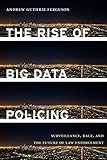The Rise of Big Data Policing : Surveillance, Race, and the Future of Law Enforcement / Andrew Guthrie Ferguson.
Material type: TextPublisher: New York, NY : New York University Press, [2017]Copyright date: ©2017Description: 1 online resourceContent type:
TextPublisher: New York, NY : New York University Press, [2017]Copyright date: ©2017Description: 1 online resourceContent type: - 9781479892822
- 9781479854608
- Big data -- United States
- Criminal statistics -- United States
- Data mining in law enforcement -- United States
- Discrimination in law enforcement -- United States
- Electronic surveillance -- United States
- Law enforcement -- United States -- Data processing
- Police -- United States -- Data processing
- Racial profiling in law enforcement -- United States
- LAW / Criminal Law / General
- 363.2/32028557 23
- HV8141
- online - DeGruyter
| Item type | Current library | Call number | URL | Status | Notes | Barcode | |
|---|---|---|---|---|---|---|---|
 eBook
eBook
|
Biblioteca "Angelicum" Pont. Univ. S.Tommaso d'Aquino Nuvola online | online - DeGruyter (Browse shelf(Opens below)) | Online access | Not for loan (Accesso limitato) | Accesso per gli utenti autorizzati / Access for authorized users | (dgr)9781479854608 |
Browsing Biblioteca "Angelicum" Pont. Univ. S.Tommaso d'Aquino shelves, Shelving location: Nuvola online Close shelf browser (Hides shelf browser)

|

|

|

|

|

|

|
||
| online - DeGruyter The Strange Careers of the Jim Crow North : Segregation and Struggle outside of the South / | online - DeGruyter "Jesus Saved an Ex-Con" : Political Activism and Redemption after Incarceration / | online - DeGruyter Old Futures : Speculative Fiction and Queer Possibility / | online - DeGruyter The Rise of Big Data Policing : Surveillance, Race, and the Future of Law Enforcement / | online - DeGruyter Aztlán and Arcadia : Religion, Ethnicity, and the Creation of Place / | online - DeGruyter Living with Alzheimer's : Managing Memory Loss, Identity, and Illness / | online - DeGruyter Boundaries of Love : Interracial Marriage and the Meaning of Race / |
Frontmatter -- Contents -- Introduction -- 1. Big Data’s Watchful Eye -- 2. Data Is the New Black -- 3. Whom We Police -- 4. Where We Police -- 5. When We Police -- 6. How We Police -- 7. Black Data -- 8. Blue Data -- 9. Bright Data -- 10. No Data -- Conclusion -- Notes -- Index -- About the Author
restricted access online access with authorization star
http://purl.org/coar/access_right/c_16ec
Winner, 2018 Law & Legal Studies PROSE AwardThe consequences of big data and algorithm-driven policing and its impact on law enforcementIn a high-tech command center in downtown Los Angeles, a digital map lights up with 911 calls, television monitors track breaking news stories, surveillance cameras sweep the streets, and rows of networked computers link analysts and police officers to a wealth of law enforcement intelligence.This is just a glimpse into a future where software predicts future crimes, algorithms generate virtual “most-wanted” lists, and databanks collect personal and biometric information. The Rise of Big Data Policing introduces the cutting-edge technology that is changing how the police do their jobs and shows why it is more important than ever that citizens understand the far-reaching consequences of big data surveillance as a law enforcement tool.Andrew Guthrie Ferguson reveals how these new technologies —viewed as race-neutral and objective—have been eagerly adopted by police departments hoping to distance themselves from claims of racial bias and unconstitutional practices. After a series of high-profile police shootings and federal investigations into systemic police misconduct, and in an era of law enforcement budget cutbacks, data-driven policing has been billed as a way to “turn the page” on racial bias.But behind the data are real people, and difficult questions remain about racial discrimination and the potential to distort constitutional protections. In this first book on big data policing, Ferguson offers an examination of how new technologies will alter the who, where, when and how we police. These new technologies also offer data-driven methods to improve police accountability and to remedy the underlying socio-economic risk factors that encourage crime.The Rise of Big Data Policing is a must read for anyone concerned with how technology will revolutionize law enforcement and its potential threat to the security, privacy, and constitutional rights of citizens.Read an excerpt and interview with Andrew Guthrie Ferguson in The Economist.
Mode of access: Internet via World Wide Web.
In English.
Description based on online resource; title from PDF title page (publisher's Web site, viewed 06. Mrz 2024)


